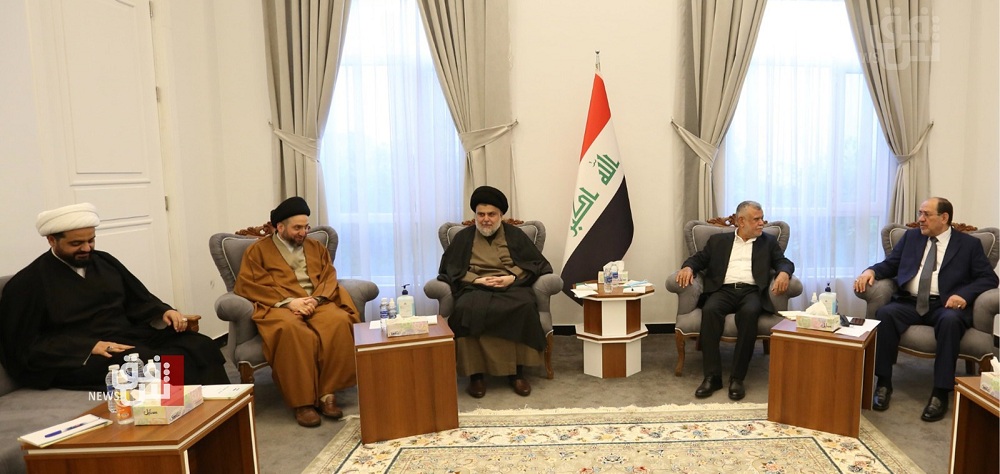Alwaght- About two months after the Iraqi parliamentary elections, a limbo remains dominant in the Iraqi political stage. However, over the past week, with an initiative presented by Shiite Coordination Framework (SCF) it seems that political gridlock is moving to formation of a new government.
A meeting on Friday brought together Muqtada al-Sadr, the head of Sadrist Movement, and the members of the SCF. This meeting indicates that Sadrist Movement's political excitement that followed the election results is now moving to moderation and a more pragmatism that would help untie the Gordion knot of government formation.
After announcement of the election results, according to which the alliance affiliated with al-Sadr with 73 seats won the most votes, the Shiite cleric and some other figures showed hard-line behavior. Setting heart on alliance with the Sunni Progress bloc with 37 seats and the Kurdistan Democratic Party (KDP) with 31 seats for a new government, al-Sadr tried to be inattentive to other Shiite groups.
Sadr's attempt to form a majority government comes as protests against the results announced by the Independent High Electoral Commission (IHEC) continue, and so far the results have not been accepted by some blocs. However, in a significant change and in a historic meeting, the SCF leaders met with al-Sadr on December 2, 2021 at the home of Hadi al-Amiri, the leader of the Fatah coalition. Also, reports suggest that the SCF leaders, including prominent individuals such as StHadi al-Amiri, Nouri al-Maliki, and Ammar Al-Hakim will meet with al-Sadr today at his residence in Najaf to hold talks and complete the negotiations about the election case.
Now here is a question: What's behind al-Sadr's flexibility and shift of approach to dialogue after tough stances in dealing with the SCF? The fact is that he has begun to accept the realities on the ground.
Difficulty of forming a government and neglecting Shiite majority demands
Although al-Sadr won the majority of votes with 73 seats, it is noteworthy that his coalition is not the majority among the Shiites. Rather, the dominant faction in the Shiite camp is SCF. Perhaps, primarily the Sadrist thought was that it can coalesce with the Kurds and Sunnis and easily form a government and new prime minister. But the field realities show that isolating the Shiite majority is not only impossible but also can bring more political standoff.
Basically, the post-Saddam Iraqi politics have not been based on a majority-minatory formula. Rather, governments have been formed regardless of the political weight of factions in the parliament. In the new circumstances, al-Sadr seems to think that breaking the political traditions and eliminating the rival Shiites can cost him highly and irreversibly. It can be boldly said that al-Sadr's meeting with his sworn political enemy the former PM Nouri al-Maliki is indicative of buying the facts, despite his initial radical positions.
Concerns about betting purely on Barzani and Halbousi
Al-Sadr looks uncertain about laying all of his eggs in the basket of coalition with the Kurds and Sunnis. He is, actually, afraid that they would not hold firm in the course of government formation. The fact is that Mohammad al-Halbousi, the parliament speaker and representing the Sunnis, and Massoud Barzani, the leader of the KDP, are aware of the power and position of the SCF, and so far all the signals sent out by these two actors indicate that they do not want to stand in the face of the majority Shiites. Weigh up the situation, al-Sadr saw it better to fine-tune his posture and accept the SCF as a partner in a new government.
Hard for al-Sadr to set aside opposition role and accept leadership in new government
Sadrist Movement's nature and power gain during all parliamentary elections since 2010 are realized by playing role of opposition. In other words, being a constant critic of the Iraqi politics, al-Sadr have been attracting popular votes, while sometimes not shouldering political responsibility as a coalition leader. Now he is worried about taking direct responsibility and naming a PM. He is concerns that his current popularity would shrink should a government affiliated with him fail to patch up things. Therefore, under a realistic scenario, we should suggest that would name candidates for key posts and ministries rather than the whole government.



























